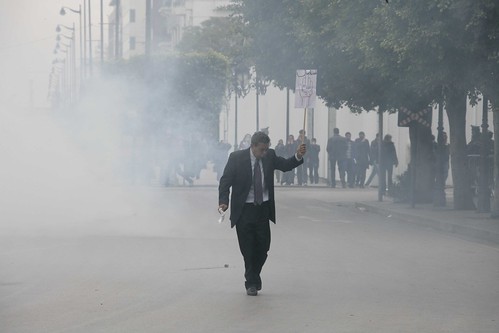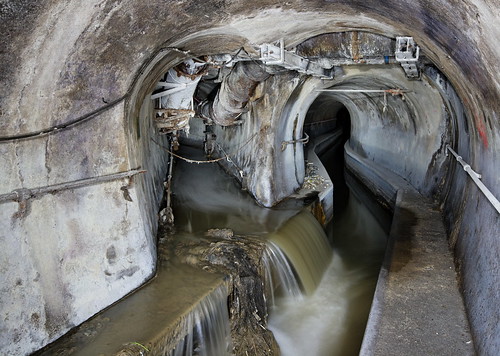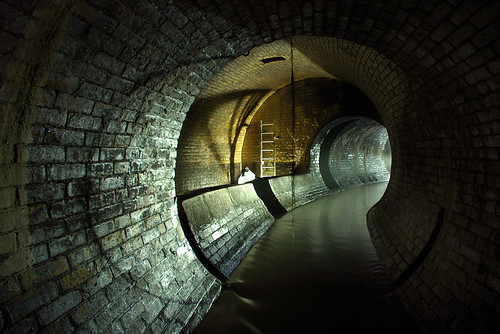Information Half-Life
1.
This is my general experience with Twitter: It is very good for telling me that SOMETHING is happening but absolutely terrible for telling me what is happening because of the waves and delays of echoed rumours and misinformation. I like Twitter best when my carefully selected group of overlapping but disparate people brings me endless novelty and hate it when they repeat each other. I tend to tune it out at times when things jump off. After the earthquake in Japan as the reactors spent their first several hours in an uncertain state of melting down or not melting down was one of those times.
 photo credit: Kaptain KoboldIn the early days of Twitter, when people were still making jokes about sandwiches and that media was conducting positively embarrassing interviews with the founders, there was a lot of discussion about what Twitter was for. The vision that Twitter settled on was to be the pulse of the planet. And so they set themselves to the task of getting real good at providing us with realtime information exchange.The unexamined assumption is the same as in live TV reporting, that real time information MATTERS. I submit that it doesn't, it really, really doesn't in most contexts. Japan's nuclear problem is like the story of Gabrielle Giffords' changing health status and the soul searching that the media did afterwards. It does not matter that we had bad information for 30 minutes. It does not matter that Giffords was briefly thought to be dead and then turned out to be only mostly dead. Because for most of the world, that information does not matter within the granularity of the time that it was bad information.At this moment, the current status of the nuclear plants in Japan matters for about 200,000 people in the world. This is the number of people who can do anything about it. Most of those 200,000 people can only decide whether or not to flee further away. They need information at the 15-minute scale probably. A very tiny minority of the people need information at the moment to moment scale. This is the team of people tasked with bringing the reactors under control. For the rest of us, we need information at the daily scale or less. Because the ramifications of Japan reactor situation IF THEY MATTER AT ALL matter in regard to decisions made at the scale of decades and centuries.It is completely insane that countries are announcing that they are scaling back or cancelling nuclear programs based on Japan's troubles. If those programs were a good idea two weeks ago they are still a good idea now. And if they might have been converted from a good idea to a bad idea based on evidence coming out of Japan then smart decision makers need to wait until the information has the stability and solidity of data that will support a decade/century scale decision.
photo credit: Kaptain KoboldIn the early days of Twitter, when people were still making jokes about sandwiches and that media was conducting positively embarrassing interviews with the founders, there was a lot of discussion about what Twitter was for. The vision that Twitter settled on was to be the pulse of the planet. And so they set themselves to the task of getting real good at providing us with realtime information exchange.The unexamined assumption is the same as in live TV reporting, that real time information MATTERS. I submit that it doesn't, it really, really doesn't in most contexts. Japan's nuclear problem is like the story of Gabrielle Giffords' changing health status and the soul searching that the media did afterwards. It does not matter that we had bad information for 30 minutes. It does not matter that Giffords was briefly thought to be dead and then turned out to be only mostly dead. Because for most of the world, that information does not matter within the granularity of the time that it was bad information.At this moment, the current status of the nuclear plants in Japan matters for about 200,000 people in the world. This is the number of people who can do anything about it. Most of those 200,000 people can only decide whether or not to flee further away. They need information at the 15-minute scale probably. A very tiny minority of the people need information at the moment to moment scale. This is the team of people tasked with bringing the reactors under control. For the rest of us, we need information at the daily scale or less. Because the ramifications of Japan reactor situation IF THEY MATTER AT ALL matter in regard to decisions made at the scale of decades and centuries.It is completely insane that countries are announcing that they are scaling back or cancelling nuclear programs based on Japan's troubles. If those programs were a good idea two weeks ago they are still a good idea now. And if they might have been converted from a good idea to a bad idea based on evidence coming out of Japan then smart decision makers need to wait until the information has the stability and solidity of data that will support a decade/century scale decision.
2.
So far this has been an instructive example of what happens when I'm left to my own devices and not careful about what I'm writing. Punditry without speculation! The worst.I want to pick up on the core idea, that there are many situations where up-to-the-instant information is useless. There is evidence in some domains that this kind of knowledge is worse than useless. In behavioural economics, they've discovered situations where access to timely information [PDF] is harmful. And in those experiments, people were getting good data.
 photo credit: jameskadamsonThis suggests a design opportunity.In the era of the firehose, there is a whole subgenre of writing about how people manage their information diet. There was a brief fad of them in my corner of the Internet back in 2009 (at Tomorrow Museum, Snarkmarket, and Scrawled in Wax) and The Atlantic has been running the media diets of the smart and famous for some time. One of my favourites is Robert Scoble's love letter to the noise.Scoble is perhaps an extreme edge of the information power-diet. The other extreme edge, I suppose, is monks in monasteries. But we don't tend to listen that well to the people from monasteries when they do come back out into the world with their opinions. For one thing, they haven't accumulated a big follower list. Neal Stephenson's Anathem imagines a setting where monks who seal themselves off for a year, decade, century, or millennium are listened to with great intensity. Their practice is called the Discipline. When they emerge every year, decade, century, or millennium it is for 10 days and it is called Apert.It would be an interesting practice to conduct a series of mini-Disciplines, with mini-Aperts. Perhaps disconnecting for 6 out of 7 days. It would be even more interesting to layer the Discipline with informational relevance. Imagine setting up sets of feeds such that each one had a schedule of windows when you could check in on it and topics were linked to the appropriate schedule. Imagine having little homunculi that were smart enough to sort news for you, passing off what your loved ones were up to moment to moment but holding information about the stock market at bay for 5 years, then giving you the best information for the brief period that you needed it. Maybe you need to know about what's going on with the reactors in Japan on a weekly or monthly basis. Maybe your neighbour who is involved in CANDU reactor safety inspections needs daily updates.
photo credit: jameskadamsonThis suggests a design opportunity.In the era of the firehose, there is a whole subgenre of writing about how people manage their information diet. There was a brief fad of them in my corner of the Internet back in 2009 (at Tomorrow Museum, Snarkmarket, and Scrawled in Wax) and The Atlantic has been running the media diets of the smart and famous for some time. One of my favourites is Robert Scoble's love letter to the noise.Scoble is perhaps an extreme edge of the information power-diet. The other extreme edge, I suppose, is monks in monasteries. But we don't tend to listen that well to the people from monasteries when they do come back out into the world with their opinions. For one thing, they haven't accumulated a big follower list. Neal Stephenson's Anathem imagines a setting where monks who seal themselves off for a year, decade, century, or millennium are listened to with great intensity. Their practice is called the Discipline. When they emerge every year, decade, century, or millennium it is for 10 days and it is called Apert.It would be an interesting practice to conduct a series of mini-Disciplines, with mini-Aperts. Perhaps disconnecting for 6 out of 7 days. It would be even more interesting to layer the Discipline with informational relevance. Imagine setting up sets of feeds such that each one had a schedule of windows when you could check in on it and topics were linked to the appropriate schedule. Imagine having little homunculi that were smart enough to sort news for you, passing off what your loved ones were up to moment to moment but holding information about the stock market at bay for 5 years, then giving you the best information for the brief period that you needed it. Maybe you need to know about what's going on with the reactors in Japan on a weekly or monthly basis. Maybe your neighbour who is involved in CANDU reactor safety inspections needs daily updates.
 photo credit: Sukanto DebnathTo some degree, the need for different time scales of information is known. It's why most democracies have two houses with representatives that hold office for different lengths of time. It's why there are specialist presses and then more generalist news organs. But there are obvious points of failure. 24 hour news networks, and the corresponding political tactical unit, "the news cycle" are one. The misinformation echo chamber and the routine failure of corrections to catch up with shocking headlines is another.Imagine a government where senators are elected to go and live in a cave for 6 years. When their term is up, they emerge blinking into the sunlight and we lay out for them the current issues of the day. Their judgement is final. What kind of issues would we save up for that group of people?
photo credit: Sukanto DebnathTo some degree, the need for different time scales of information is known. It's why most democracies have two houses with representatives that hold office for different lengths of time. It's why there are specialist presses and then more generalist news organs. But there are obvious points of failure. 24 hour news networks, and the corresponding political tactical unit, "the news cycle" are one. The misinformation echo chamber and the routine failure of corrections to catch up with shocking headlines is another.Imagine a government where senators are elected to go and live in a cave for 6 years. When their term is up, they emerge blinking into the sunlight and we lay out for them the current issues of the day. Their judgement is final. What kind of issues would we save up for that group of people?
3.

 photo credit: john curleyCicada, grant me Discipline to ignore the things I do not need, Clarity to understand the things I do, and Wisdom to know the difference.
photo credit: john curleyCicada, grant me Discipline to ignore the things I do not need, Clarity to understand the things I do, and Wisdom to know the difference.
4.

 photo credit: adresonCicada™ monitoring systems. Giving you the Clarity to understand the things you need and the Discipline to ignore the things you do not with our patented algorithms that have the Wisdom to know the difference.
photo credit: adresonCicada™ monitoring systems. Giving you the Clarity to understand the things you need and the Discipline to ignore the things you do not with our patented algorithms that have the Wisdom to know the difference.
5.

 photo credit: Nasser Nouri"You say it is called Cicada. I say it is just another tool of a centuries-old system of oppression and violence. You say Cicada will not hear us. I say our people are crying out today. Our children are dying today."This will not stand. We will not go quietly into the night. Our voice will awaken the sleepers, whether Cicada wills it or no."
photo credit: Nasser Nouri"You say it is called Cicada. I say it is just another tool of a centuries-old system of oppression and violence. You say Cicada will not hear us. I say our people are crying out today. Our children are dying today."This will not stand. We will not go quietly into the night. Our voice will awaken the sleepers, whether Cicada wills it or no."
6.
"The critical insight that we are behooven to recall is that Cicada is software. A process, yes. A system of rules and regulations, yes. An organizing principle, yes to all of those things as well. But at the heart, under all the pomp and ceremony, there exists software."This is critical because software may have bugs. Indeed it may be laden with bugs. And this is old software. It is old software that has run for quite some time – we all know this – it has run for quite some time and it has a learning capacity. From the beginning, it has had a learning capacity built in. You might wonder, what it has learned.
 photo credit: johnwilliamsphd"But what I want to say is that is it software that was designed for a specific reason and that was to make decisions that – left to our own devices – we might not make for ourselves. It was designed to save us from ourselves and, to be sure, I am not saying that it has failed. Indeed we are all here, this room is here and we have power, the lights work, there will be a meal tonight, we can say that it has at least succeeded in that regard. We have survived you see. We have survived and so the software has worked."But it works precisely because it makes decisions that we would not make, indeed it succeeds only in so far as it makes those decisions. If it only made decisions that we would make, we would not need it. We could shut it down, send everyone home and say 'thank you for your time, but you are telling us what we were going to do anyway'. So this is a software that works precisely by producing unexpected results. It is at is heart software that contains or at least gives the appearance of containing an ineffable wisdom. It tells us not to do what we might otherwise decide to do, and then we don't do it because we were told, and supposedly, things are better.
photo credit: johnwilliamsphd"But what I want to say is that is it software that was designed for a specific reason and that was to make decisions that – left to our own devices – we might not make for ourselves. It was designed to save us from ourselves and, to be sure, I am not saying that it has failed. Indeed we are all here, this room is here and we have power, the lights work, there will be a meal tonight, we can say that it has at least succeeded in that regard. We have survived you see. We have survived and so the software has worked."But it works precisely because it makes decisions that we would not make, indeed it succeeds only in so far as it makes those decisions. If it only made decisions that we would make, we would not need it. We could shut it down, send everyone home and say 'thank you for your time, but you are telling us what we were going to do anyway'. So this is a software that works precisely by producing unexpected results. It is at is heart software that contains or at least gives the appearance of containing an ineffable wisdom. It tells us not to do what we might otherwise decide to do, and then we don't do it because we were told, and supposedly, things are better.
 photo credit: stevec77"Again, I am not saying that this system has failed, surely not. I admire – of course I do – I admire the restraint. There is a need in our society for restraint. We have been given it, the importance of disconnection. The wisdom of isolation, yes all of this I celebrate."But we must admit, mustn't we, that we are left with an unanswerable question. A question, I think, which must be asked even though it cannot be answered. The question that I would like to ask is this:"What is the difference between ineffable wisdom, and a bug?"
photo credit: stevec77"Again, I am not saying that this system has failed, surely not. I admire – of course I do – I admire the restraint. There is a need in our society for restraint. We have been given it, the importance of disconnection. The wisdom of isolation, yes all of this I celebrate."But we must admit, mustn't we, that we are left with an unanswerable question. A question, I think, which must be asked even though it cannot be answered. The question that I would like to ask is this:"What is the difference between ineffable wisdom, and a bug?"
7.

 photo credit: ZedZaP"Then I submit to you that you have no recollection of what things were like before Cicada."
photo credit: ZedZaP"Then I submit to you that you have no recollection of what things were like before Cicada."
8.

 photo credit: 60 in 3"Let me tell you a secret. Sometimes files just go missing."
photo credit: 60 in 3"Let me tell you a secret. Sometimes files just go missing."
9.

 photo credit: greenpeanut"But perhaps the most compelling candidate in this slate of Cicada nominees is the young man who does not even go by a name, though supporters refer to him as "Mike". He's a man of few words, having taken a vow of disconnection two years ago—the idea being that it would begin to prepare him for his dormancy period."Strange? Perhaps. It takes a certain kind of strangeness to put yourself out for this job. And unlike so many of his peers, he is associated with no political party, no religious unit, and doesn't appear to have the same drive for a career in consultancy the infects so many that stand for election. These attributes alone ought to be enough to give voters pause."
photo credit: greenpeanut"But perhaps the most compelling candidate in this slate of Cicada nominees is the young man who does not even go by a name, though supporters refer to him as "Mike". He's a man of few words, having taken a vow of disconnection two years ago—the idea being that it would begin to prepare him for his dormancy period."Strange? Perhaps. It takes a certain kind of strangeness to put yourself out for this job. And unlike so many of his peers, he is associated with no political party, no religious unit, and doesn't appear to have the same drive for a career in consultancy the infects so many that stand for election. These attributes alone ought to be enough to give voters pause."
10.
The system that runs the world is called Cicada.Everyone knows this. Every schooling child knows this, assuming that they have levelled their learning sufficiently, which we can be assured they do, because Cicada sees to it.We have all heard, of course, of what came before; when Cicada was a time manager among many. The era of the Fire Rose. I don't believe it is true. No one could have lived like that. I know. I have the overrides, I have drunk from the flow. I know that it's cliche'd to talk about drowning in information but I promise you that was the feeling. Data without meaning or relevance. A sewer of knowledge.
 photo credit: Esprit de selThis could not have been how it was. To have full access to the flow is to be paralyzed, but it is clear that our ancestors were not paralyzed. They built the networks after all. The pre-shaped matter networks, the data networks, even primitive sensor nets. All of these things were accomplished. There was a time when matter networks preceeded the data networks. All of this was accomplished without Cicada intervention.Some logic: If Ciacada shows the flow when you give it the overrides, and the flow as shown makes certain things impossible, and some of those impossible things are things we know to have occurred, then the flow as shown must be somehow false. Cicada is misleading us about the nature of the flow.Therefore a hypothesis: There is an alternative.Further: There is an alternative that is being kept from us.
photo credit: Esprit de selThis could not have been how it was. To have full access to the flow is to be paralyzed, but it is clear that our ancestors were not paralyzed. They built the networks after all. The pre-shaped matter networks, the data networks, even primitive sensor nets. All of these things were accomplished. There was a time when matter networks preceeded the data networks. All of this was accomplished without Cicada intervention.Some logic: If Ciacada shows the flow when you give it the overrides, and the flow as shown makes certain things impossible, and some of those impossible things are things we know to have occurred, then the flow as shown must be somehow false. Cicada is misleading us about the nature of the flow.Therefore a hypothesis: There is an alternative.Further: There is an alternative that is being kept from us.
 photo credit: sub-urban.comThere are elections. We choose who we think will be the best dormant. We seek their disconnected wisdom and we live by it. They are always a mix. There are the aesthetes. There are the ascetics. There are the ambitious. It is well known that dormants who emerge are often given many opportunities for speaking and consultancy. They have a louder voice for the pain of their investment.We are told that their isolation is their wisdom. We are told that to drink fully of the flow is to drown. Much is parcelled out. Much is rationed. People petition Cicada for intervention. We are assured that the decision to accept or reject a petition is based on a slowly grown and sophisticated system of built wisdom. We are promised that the nature of the dormant affords them a perspective of merit. This is a human operation. Cicada does not render judgement, the dormant do.But the dormant are in short supply. And though the quartermaster does not go into battle, he or she might still determine the outcome of the war, by deciding who eats and who starves. Cicada decides who starves.
photo credit: sub-urban.comThere are elections. We choose who we think will be the best dormant. We seek their disconnected wisdom and we live by it. They are always a mix. There are the aesthetes. There are the ascetics. There are the ambitious. It is well known that dormants who emerge are often given many opportunities for speaking and consultancy. They have a louder voice for the pain of their investment.We are told that their isolation is their wisdom. We are told that to drink fully of the flow is to drown. Much is parcelled out. Much is rationed. People petition Cicada for intervention. We are assured that the decision to accept or reject a petition is based on a slowly grown and sophisticated system of built wisdom. We are promised that the nature of the dormant affords them a perspective of merit. This is a human operation. Cicada does not render judgement, the dormant do.But the dormant are in short supply. And though the quartermaster does not go into battle, he or she might still determine the outcome of the war, by deciding who eats and who starves. Cicada decides who starves.
 photo credit: gnackgnackgnackWhat evidence do we have that these are the right decisions? What oversight can we possess? We have only the oversight of history. It was not always like this, and we did well. Information did not cripple civilization, it permitted ir to grow. Left to our own devices, we will tame the sewer of knowledge, and reclaim our rightful place as captains of history.We demand that Cicada give us back the flow.
photo credit: gnackgnackgnackWhat evidence do we have that these are the right decisions? What oversight can we possess? We have only the oversight of history. It was not always like this, and we did well. Information did not cripple civilization, it permitted ir to grow. Left to our own devices, we will tame the sewer of knowledge, and reclaim our rightful place as captains of history.We demand that Cicada give us back the flow.